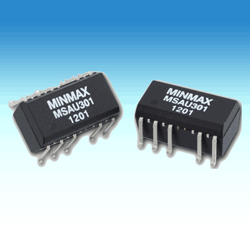
One look at the term “dc/dc converter” tells you that it is different from most converters. An ac/dc converter, for example, is an electronic circuit that changes alternating current to direct current. An A/D converter changes analog signals to digital signals. A dc/dc converter, on the other hand, changes a direct-current voltage level to another direct-current voltage level, either higher or lower. Dc/dc converters are important in portable electronic devices such as cellular phones and laptop computers, which are supplied with power from batteries primarily. It goes without saying that batteries, the source of direct current, are what make “portable” possible. Dc/dc converters, in either module or integrated circuit form, make battery efficiency possible.
The MSAU301 dc/dc converter from MINMAX Power is one of the many such devices that come in module or integrated circuit form.
Electronic Products Senior Editor Paul O'Shea explains, “The need for dc/dc converters is ever expanding. They are important for many applications and are used extensively by OEMs and system integrators for applications in the healthcare, communications, computing, storage, business systems, test and measurement, instrumentation, and industrial equipment industries. The different types include those used for Advanced Telecom Computing Architecture systems (ATCA), high-voltage dc/dc converters that can be used for power-factor correcting modules, isolated dc/dc converters to precisely match the needs of low-voltage semiconductor devices (for example, Intermediate Bus Converters), non-isolated dc/dc converters for memory power and voltage regulator modules for processors (including voltage regulator modules), low-profile converters, and power modules, as well as for microTCA system power modules that implement power conversion, management and protection.”
Robert Marcheti of Vicor, one of the manufacturers of dc/dc converters, observed in Electronic Products in 2003, “Designers may assume that having specified the system's input and the output voltage and power, they've satisfied the essential criteria for selecting a dc/dc converter. These values, however, are necessary but not sufficient. Depending on the architecture of your system, dc/dc converter selection criteria may include the number of voltages you need, power levels, input voltage range, the need for isolation, output-voltage regulation, efficiency, noise generation, and physical size. Further, agency approvals, compatible accessories, and the availability of application engineering support may also figure into the selection process.”
A grammatical note is in order: You can write this device either with capitals or not, with a slash, a hyphen, or the word “to”: so a dc/dc converter, DC/DC converter, dc-dc converter, or DC-to-DC converter all do the same job: change voltage levels to make portable power more efficient.
Advertisement
Learn more about Electronic Products Magazine





